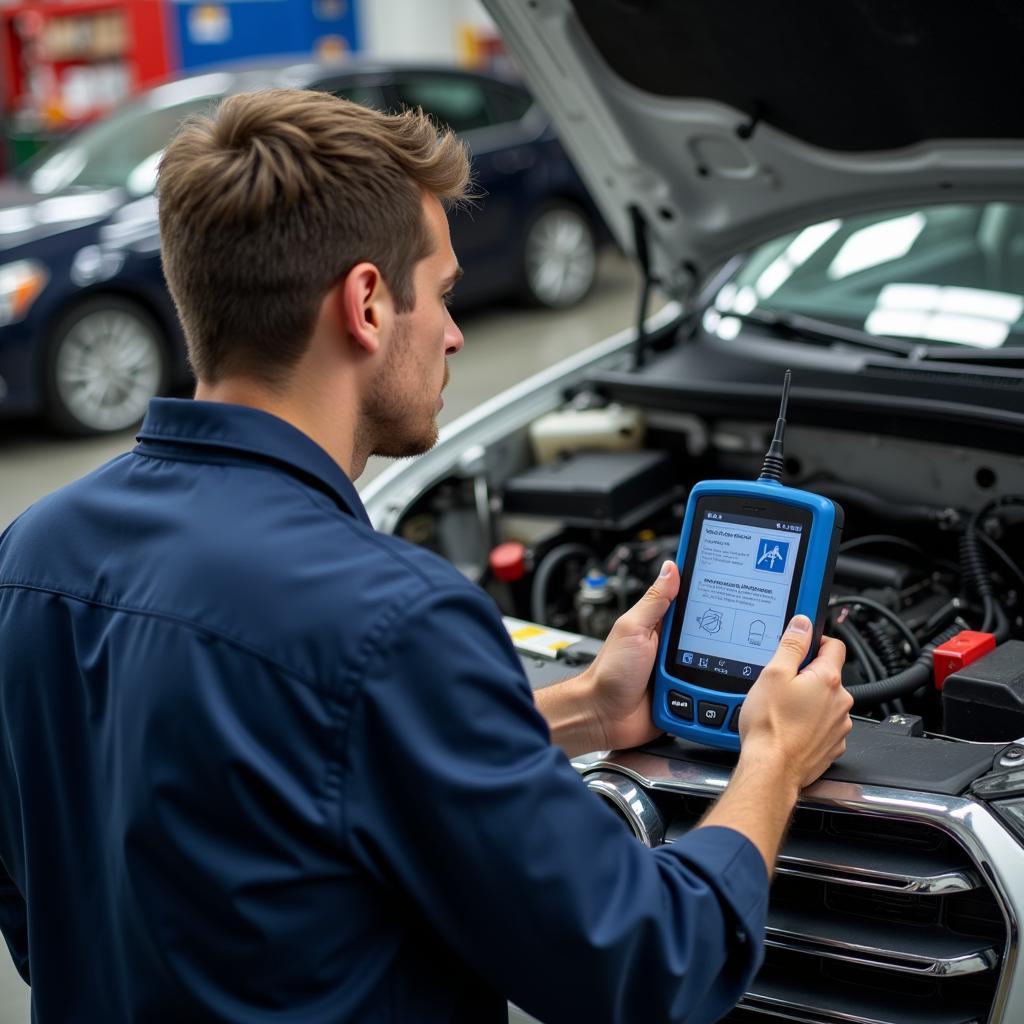Diagnostic software for cars has revolutionized how we diagnose and repair vehicles. Gone are the days of relying solely on experience and intuition. Today, with the help of advanced software, mechanics and even car owners can access a wealth of information hidden within a car’s computer system. But with so many options available, choosing the right diagnostic software for your needs can be overwhelming. This comprehensive guide will delve into the world of car diagnostic software, exploring its benefits, features, and how to choose the perfect one for you.
What is Diagnostic Software for Cars?
At its core, diagnostic software for cars acts as a bridge between your car’s computer and you. Modern vehicles are equipped with Engine Control Units (ECUs), essentially mini-computers that monitor and control various systems within the car. Diagnostic software allows you to tap into these ECUs, providing valuable insights into the health and performance of your vehicle.
Why is Car Diagnostic Software Essential?
Using diagnostic software for cars is no longer a luxury but a necessity for several reasons:
- Accurate Diagnosis: The software can pinpoint the root cause of car problems with incredible accuracy, eliminating guesswork and unnecessary repairs.
- Cost Savings: By identifying the exact issue, you can avoid replacing parts that are still functioning correctly.
- Preventative Maintenance: Regular scans using diagnostic software can detect minor issues before they escalate into major problems, saving you time and money in the long run.
- Enhanced Understanding: Car diagnostic software allows you to gain a deeper understanding of your vehicle’s performance, empowering you to make informed decisions about its maintenance.
Key Features to Look for in Diagnostic Software
When choosing car diagnostic software, consider these essential features:
- Vehicle Compatibility: Ensure the software supports the make, model, and year of your car.
- Diagnostic Trouble Codes (DTCs): The software should be able to read and interpret DTCs, which are codes stored by the car’s ECU indicating specific issues.
- Live Data Stream: This feature lets you view real-time data from various sensors, allowing you to monitor engine performance, fuel economy, and other crucial parameters.
- Bi-Directional Control: Some advanced software allows you to perform functions like activating solenoids or running tests, further aiding in diagnosis and repair.
- User Interface: Opt for software with an intuitive and user-friendly interface, making it easy to navigate and interpret data.
Different Types of Diagnostic Software
The market offers a range of car diagnostic software options, each catering to different needs and budgets:
- Handheld Scanners: These portable devices are popular among DIY enthusiasts and offer basic functionality at an affordable price.
- PC-Based Software: More comprehensive and feature-rich, PC-based software provides in-depth diagnostics and often comes with regular updates.
- Mobile Apps: Connecting wirelessly to your smartphone or tablet, mobile apps offer convenience and portability for quick diagnostics.
Choosing the Right Software for You
 Mechanic using a diagnostic tool on a car
Mechanic using a diagnostic tool on a car
Selecting the right car diagnostic software depends on your specific requirements:
- DIY Enthusiasts: A handheld scanner or a basic mobile app with DTC reading and clearing capabilities might suffice.
- Professional Mechanics: Investing in comprehensive PC-based software with advanced features like bi-directional control and extensive vehicle coverage is recommended.
- Car Owners: Mobile apps or handheld scanners offer a convenient way to monitor your car’s health and perform basic diagnostics.
“Choosing the right diagnostic software can be a game-changer for car owners. It’s like having a direct line to your car’s thoughts, allowing you to understand its needs and address them proactively.” – David Miller, Senior Automotive Engineer.
Conclusion
Diagnostic software for cars has become an indispensable tool in the automotive world. Whether you’re a car enthusiast, a professional mechanic, or a car owner, understanding and utilizing car diagnostic software can save you time, money, and frustration. By carefully considering your needs and exploring the diverse range of options available, you can find the perfect software to keep your car running smoothly for years to come.
FAQs
1. Can I use any diagnostic software on my car?
No, it’s crucial to choose software compatible with your car’s make, model, and year.
2. What is a DTC?
DTC stands for Diagnostic Trouble Code. These are codes stored by your car’s ECU, indicating specific problems.
3. Do I need technical expertise to use car diagnostic software?
While some software requires basic technical knowledge, many options are user-friendly and designed for everyday car owners.
4. How often should I scan my car with diagnostic software?
It’s recommended to perform a scan at least once a year or whenever you experience car troubles.
5. Where can I find reliable car diagnostic software?
Several reputable online retailers and automotive stores offer a wide selection of car diagnostic software.
Need expert advice on choosing the right diagnostic software for your needs? Contact us today via WhatsApp: +1(641)206-8880, Email: [email protected]. Our team of dedicated experts is available 24/7 to assist you.

Leave a Reply